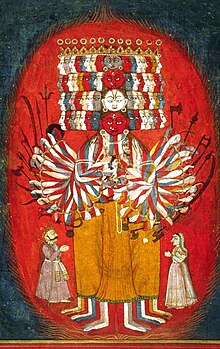Moksha
Appearance

Moksha (Sanskrit: मोक्ष mokṣa), also called vimoksha, vimukti and mukti, means emancipation, liberation or release. In its soteriological and eschatological senses, it refers to freedom from saṃsāra, the cycle of death and rebirth. In Hindu traditions, Moksha is a central concept and included as one of the four aspects and goals of human life. The concept of Moksha is found In Jainism, Buddhism and Hinduism.
Quotes
[edit]- To acknowledge a polar relation between self-effort and grace as a feature characteristic of Moksha enables the avoidance of the extremes of moral legalism and graceless moralism on the one side and amoral lawlessness and supra-ethical mysticism on the other. It is the affirmation of moral conscience but as having a more than moral foundation. Being precedes action in everything that is, including man, although in man as the bearer of freedom previous action determines present being. Moksha, therefore, phenomenologically at least understood strictly from the self restricted perspective of the striving seeker, is not exclusively God’s work utterly apart from man’s latent resources and endowment.
- Gwilym Beckerlegge, in World Religions Reader (2001), p. 292
- Moksha is not just freedom from the cycle of rebirths, as is often misunderstood.
- Gwilym Beckerlegge, in "World Religions Reader (2001)"
- Moksha or Emancipation is not a product or effect of any action. That which is the product of anything is bound to be non-permanent (anitya) and as moksha is permanent and eternal, it cannot be supposed to be the resultant of anything; it is the realization of the self as it is by its nature, and this becomes possible only when the Karma of the Jiva has been exhausted.
- Nalini Kanta Brahma, in The Fundamentals Of Religion (22 September 2007), p. 101
- Moksha or freedom is the Swabhava, the inherent constitution and essence of the soul and is not to be supposed as generated in the Soul through the action of anything else.
- Nalini Kanta Brahma, in “The Fundamentals Of Religion (22 September 2007)”, p. 101
- The concept of Moksha in Indian thought represents an extreme form of the urge to get away from fact.
- Margaret Chatterjee, in Lifeworlds and Ethics: Studies in Several Keys (2007), p. 60

- The only route to Moksha is through dharma, since freedom is seen, on this view, not as presupposition of action but as the culmination of life. It requires a switch in thinking to be able to regard freedom as in opposition to responsibility – freedom being attained after responsibilities are over (on the extreme form of the theory as against jivanmukti form)
- Margaret Chatterjee, in “Lifeworlds and Ethics: Studies in Several Keys (2007)”, p. 60
- Liberation or moksha for much Vedantic thought was not something that can be “reached” or “acquired". Since the atman is already there as the fundamental essence of the self is merely there to be experienced.
- Jeaneane D. Fowler, in The Bhagavad Gita: A Text and Commentary for Students (2012), p. 46
- For Shankara, the path of jnana-yoga was the only one to moksha.
- Jeaneane D. Fowler, in "The Bhagavad Gita: A Text and Commentary for Students (2012)", p. 76
- To attain Moksha while alive, the individual consciousness must become non-existent because then there is nothing left in the mind. Then, due to the attainment of Moksha, he becomes immersed forever in Pure Consciousness and the Liberated. One must live out his Dharma for the sake of others.
- Swami Harinanda, in Yoga and The Portal, p. 344
- Hinduism takes a comprehensive view of the human condition and classifies all the things people seek in the world and beyond into four broad categories called purushaarthas, kama, artha, dharma and moksha.
- J. Lipner, quoted in Asia Journal of Global Studies, Issues 1-2 (1 January 2012), p. 95
- The first three goals pertain to the world we know, whereas moksha involves freedom from the world and from desires... Moksha, although the ultimate goal, is emphasized more in the last two stages of life, while artha and kama are primary only during … Hindus themselves prefer to use the Sanskrit term sanatana dharma for their religious tradition. … According to Hinduism, our experience, our reason and our dialogue with others - especially with enlightened individuals - provide provide various means of testing our understanding of spiritual and moral truth...
- Derrick M. Nault, in Asia Journal of Global Studies, Issues 1-2 (1 January 2012), p. 95
- Kama includes the pleasure of the sense, both aesthetic pleasure and sensual pleasure. Artha includes the pursuit of material well being, wealth and power. Dharma includes striving for righteousness and virtue. Moksha describes the desire for liberation from reincarnation. The first three goals pertain to the world we know, whereas moksha involves freedom from the world and from desires.
- Derrick M. Nault, in “Asia Journal of Global Studies, Issues 1-2 (1 January 2012)”, p. 95
- The ultimate goal of human life is to attain spiritual perfection (moksha), or freedom from transmigration of the atman. The social existence of an individual is means for attaining this supreme goal. Since an individual cannot attain moksha without fulfilling his (her) individual and social duties, responsibilities and obligations, Hindu social philosophy...includes the essential social principles and practices, goals of human life: dharma (moral law), artha (wealth), kama (pleasure), and moksha (spiritual perfection, the ultimate goal).
- Although there are various views among the Hindu thinkers regarding the content of moksha, all systems agree that moksha is the liberation of the soul from the bondage of flesh and the limitations of the finite body.
- Bansi Pandit, in “The Hindu Mind: Fundamentals of Hindu Religion and Philosophy for All Ages (1 January 2001)”, p. 282
- Moksha is the ultimate goal of the Hindu religious life. Moksha is called Mukti by the yogis, Nirvana by the Buddhists, and the Kingdom of heaven by the Christians.
- Bansi Pandit, in “The Hindu Mind: Fundamentals of Hindu Religion and Philosophy for All Ages (1 January 2001)”, p. 282
- What is Mukti [Moksha]? That which teaches that even the happiness of this life is slavery, and the same is the happiness of the life to come, because neither this world nor the next is beyond the laws of nature; only, the slavery of this world is to that of the next as an iron chain is to a golden one. Again, happiness, wherever it may be, being within the laws of nature, is subject to death and will not last ad infinitum. Therefore man must aspire to become Mukta, he must go beyond the bondage of the body; slavery will not do. This Mokshapath [Way to Moksha] is only in India and nowhere else.
- On the advent of Buddhism, Dharma was entirely neglected, and the path of Moksha alone became predominant.
- Vivekananda, in "The Complete Works of Swami Vivekananda/Volume 5/Writings: Prose and Poems/The East and The West/Introduction."
- He who has no enemy, and is friendly and compassionate towards all, who is free from the feelings of 'me and mine', even-minded in pain and pleasure, and forbearing — these and other epithets of like nature are for him whose one goal in life is Moksha.
- Vivekananda, in "The Complete Works of Swami Vivekananda/Volume 5/Writings: Prose and Poems/The East and The West/Introduction."
- The fourth goal of life is moksha, which means “release” from life, particularly from the cycle of death and rebirth. This goal is best practiced in the retirement and renouncer stages of life, although it can be sought in all stages of life, particularly in the two paths of deeds and devotion.
- Robert Van Voorst, in RELG: World (1 January 2012), p. 93
Moksha is well defined in Gita
[edit]
Express News Service Moksha is well defined in Gita (21 February 2013)
- The highest goal to be achieved by any human being is moksha, which means liberation from bondage. Bondage means that state where one always thinks in terms of ‘I’ and ‘mine’. In this state of ‘I’ and ‘mine’ one experiences worries, misery, lack of peace, a feeling of lacking something and a feeling of utter failure or worthlessness.
- Some people feel that performing rituals, one can attain Moksha. As a concluding part of a ritual, the priest reels of a long list of the resulting fruits a son, grandson, money, gold honours in this life and Moksha here after. Thus Moksha is included at the end of a long list of gains of a ritual performed.
- The agreed meanings of Moksha as accepted by all are-no rebirths, release from every thing bad, unholy, demerit, misery etc.
- To attain Supreme peace, everlasting peace and enjoy Supreme bliss, Lord Krishna does not say that there are different Muktis and the liberated jiva (mukta) will go to Several lokas (Vaikuntha etc) and enjoy with different grades of happiness.
- As a sign of Moksha the Gita talks of Supreme peace where there is no specific happiness and where the person forgets himself in the enjoyment of the peace.
Purusharthas: dharma, artha, kama, moksha: their relevance and currency today and for tomorrow, doctoral thesis presented at the Mahatma Gandhi University
[edit]

V.C. George, in Chapter IV - Moksha - The Spiritual Principle in in Purusharthas: dharma, artha, kama, moksha: their relevance and currency today and for tomorrow, doctoral thesis presented at the Mahatma Gandhi University, (15 July 2010)
- Moksha, the fourth purushartha, stands for the spiritual principle and is a state of bliss. It marks the consummation of the process of our moral development and is therefore the ultimate goal of human life.
- p. 92
- The common word 'moksha' comes from the Sanskrit root MUC- with the help of the formative -S. It means 'to set free, release, deliver, draw out of'.
- p.92
- Some of the analogous words used to mean moksha are mukti, Nirvana, Turiya, Kaivalya, Apavarga, Nihsreyasa etc.
- p.92
- The term moksha primarily is in the description of purusharthas and is in classical as well as modem usage, and secondarily in a generic sense to denote all that is common to its variety of usages.
- p.93
- The word moksha does not occur in any of the Vedas though the base (root) MUC - is part of the vocabulary of the first Veda where it means 'to release, to let go'. But it occurs in the Brahmanas and is frequent in classical language.
- p.93
- The term is used in Hindu Scriptures to denote both the experience of partial liberation on the earth and the state of total liberation in the divine life.
- p.93
- Two hypotheses have been formulated to the concept of moksha: One is the fear of death that might have given rise to the concept of moksha and the other is the unjust state of affairs.
- p.93
- The ancient man's fear of death and his way of tackling it might have given rise to the idea of moksha with the concept getting more and more refined down the centuries.
- p.94
- The concept of moksha might have originated depending on how the humans tackled the problem of injustice and pessimism.
- p.95
- The Upanishadic conception of moksha consists in the removal of 'all fetters' which is avidyais and in the consequent awakening of the spirit to the true self which is non-different from brahman, The Absolute.
- p.96
- According to the Mahabharata also jnana seems to be the only way to attain emancipation (moksha); knowledge alone is capable of cleansing us of all our sins.
- p.96
- Moksha does not mean any actual change in the nature of the self, but it means a change in standpoint. In other words, moksha is not merely knowing brahman, rather, it is being brahman. This being brahman is moksha in its positive sense.
- p.98
- In its negative sense, moksha means moksha from bondage...this moksha from bondage is to be attained through knowledge.
- p.98
- Before reaching this final means to moksha, the person wanting moksha has to fulfil a number of qualifications. The Vedantins in general admit this and they suggest a whole scheme of discipline, divided into karma-yoga and jnana-yoga.
- p.99
- The second concept of moksha is taken from Buddhism, one of the unorthodox systems.
- p.99
- According to Buddhist world view, Moksha consists in overcoming the causes of suffering and ultimately in freeing oneself from the process of rebirth. How to do it? This is to be done through meditative introspection and by following the eightfold path (marga) of ethics.
- p.99
- Moksha is described as the positive state of absolute bliss, the state of absolute absence of pain, the state of neither pleasure nor pain, communion with God or the company of God, the realization of the true nature of the self, an experience obtainable even in our embodied state, obtainable only after our physical death, etc.
- p.100
- In most schools of Indian philosophy, the state moksha is conceived of in such a way that either there is no object left to be known, or if any object is allowed at all, no relationship of any kind, is permitted.
- p.101
- Moksha represents an ideal state of cognitive attainment.
- Poner, p. 102
- If we die, shall we cease to live? The widespread belief in the immortality of soul and therefore the belief in moksha are problematic for the philosopher.
- p.102
- If the immortality of soul is not beyond doubt, the existence of moksha cannot logically be proved either.
- p.103
- Moksha is a concept that can be said to belong to practical philosophy. Moksha, therefore, designates an ideal to be actualized. Moksha is an ideal unlike some other ideals pertaining to things outside the self. Moksha is supposed to be the realization of the true nature of the self itself even if it be the case, as in Buddhism, that there is no true nature either of the self or of anything else.
- p.105
- One of the universally accepted ideas regarding the relationship between Moksha and Indian philosophy is that Indian philosophy is spiritual and that moksha is its main concern - it is the focal concern.
- p.106
- Difficulties such as skepticism and fatalism that obstruct a person from pursuing moksha gave rise to philosophy in India. For these difficulties are intellectual in character and are therefore to be removed by means of intellectual activities such as reflection and argumentation. This would reconcile the apparent incongruity between the actual concerns of Indian philosophy which are essentially speculative and conceptual and its supposedly real concern with moksha which is essentially non-speculative and non-conceptual in nature. In other words, Indian philosophy is the removal of these intellectual difficulties that obstruct our way to moksha.
- Karl H. Potter, p. 107
- Our belief in moksha is very ancient existing years before the christian era...Moksha is a pre-Aryna concept found in Sramana culture and later got assimilated in the Upanishads.
- p.109
- The relationship between moksha and the Indian philosophy is not integral in the sense that the one is not intelligible without the other.
- p.109
- The ideal of moksha was achieved in India as early as the Upanishadic and Buddhist times, whereas, philosophic reflection has not stopped with it; it has continued till today.
- p.115
- There are many philosophers and schools of philosophy in India that have literally nothing to do with moksha. The Nyaya, the Vaisesika, and the Mimamsa are predominant in this group. And, even those who are partly concerned with moksha, are concerned with it primarily in a philosophical manner only.
- P.119
- Moksha is not the exclusive concern of Indian philosophy. Nor is it its predominant concern. Many of the thinkers and many of the schools are not concerned with it even marginally. Many others are concerned with it only in a peripheral manner.
- P.119


